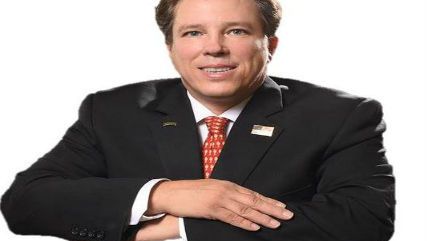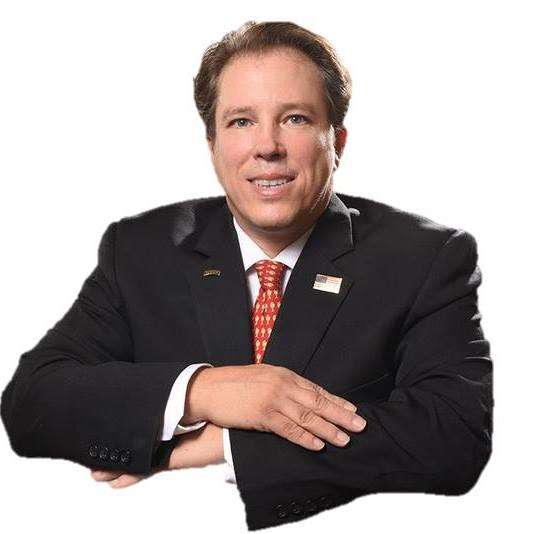Libertarian Assemblyman John Moore of Nevada Censured by the Libertarian National Committee
Party angry over Moore's vote on Raiders stadium subsidy; Moore thinks the L.P. needs to grow and "stop trying to advance the more radical agenda, pick and choose your fights and get more mainstream."

Gary Johnson, Libertarian candidate for president, told me the other week that he thinks an important part of his legacy for the Libertarian Party will be a wave of seasoned politicians from the two majors who lean libertarian choosing to run or govern as loud and proud Libertarians.

A handful of seated state legislators have already done so, switching their Party affiliation to Libertarian while already in statewide elected office.
The first currently seated legislator to do so was Nevada Assemblyman John Moore, a first-term Republican who switched to the Libertarians mid-term this January. Moore is facing his first election as a Libertarian on Tuesday, and he tells me he feels very good about his chances.
He's running against the Democrat who he beat last time, Jason Frierson, and a Republican (whose prime issue is immigration restriction) who jumped in the race at the last possible minute, Moore tells me, Norm Ross.
Moore predicts he'll end up getting 40-50 percent of non-partisan voters, 30-50 percent of Republicans, and even 10-12 percent of the Democratic vote. Moore says he's raised about $70,000 this cycle, compared to less than a thousand bucks with which he won his seat in the first place.
Still, one political party is very, very unhappy with the renegade assemblyman. This party has officially censured Moore for his perfidy on both its state and federal level.
That party is not the Republican Party Moore turned coat on; it's the Libertarian Party he joined.
This week the Libertarian National Committee (LNC) issued an official censure notice against Moore. Their reasons?
To quote from the censure notice (which passed the LNC on a 9-6 vote, done electronically), the LNC says Moore:
has during the past month voted not once but twice in the span of as many days to raise taxes on his constituents, including a vote to support a "More Cops" tax which the Libertarian Party of Nevada has tirelessly and thus far successfully opposed, and a vote to provide a $750 million subsidy to finance a billionaire-owned sports stadium at the expense of, among others, indigent persons renting weekly rooms in motels;
Moore was not only a vote for the stadium subsidy; having passed with the bare minimum required 2/3 of the Assembly, he (along with every other vote, natch) could be said to be the vote that passed it.
Even before then, as Moore complained in a phone interview yesterday, the state Party had already promptly censured him right after the stadium vote, without giving him a chance to discuss the matter with them. He also says in the aftermath he was driven for the first time in his life to block dozens of hostile attackers on his social network sites because of the abuse he was receiving.
Moore is the first to admit he's not as libertarian as some Libertarians. While he says defiantly that the censure "doesn't matter to me one bit, it's not going to alter my process or thinking at all" he grants that "I understand somewhat where some of the members are coming from. I'm not saying this in a derogatory way, but some folks I run into in the L.P. are a bit more extreme than others and unless they have been in the political process where I'm at, it's hard for them to understand the fine details and I can respect that.
"But at the same time, they didn't take my statement seriously as to my reasons."
As Moore told me, and as he told the LNC in a memo in my possession, he thinks the complaint about the "'more cops' tax" is offbase since the Assembly bill was merely enabling legislation that would let Clark County pass such a tax, not directly passing the tax itself.
The stadium vote meanwhile was, to many Libertarians, an inexcusable example of giveaways to the wealthy to help the few. Reason's Anthony Fisher called it a "crony capitalist boondoggle" in reporting on the vote last month.
But Moore sees the vote, which he stands by "100 percent," as a reflection of his job as a representative: he says he polled his constituents and found 62 percent support for the vote. "I represent first and foremost the people of my district and not a political party," Moore wrote in his memo to the LNC. In his view of his role, "I have never and will never put party objectives above the will of the people that I represent."
Moore turns libertarian purism around on the LNC, writing that "By choosing to censure me you are in FACT forcing your will upon me and everyone that does not agree with you. How is that true freedom or Liberty? NAP?"
Moore believes that the stadium subsidy will "put thousands of out of work Nevadans back to work" and that Las Vegas' status as a major convention destination will be lost without the convention center expansion that's also part of the bill.
As a practical matter, Moore also believes that procedurally if that vote failed, the Assembly would be pressed by the governor into a second vote for an enabling version of the bill that would leave the matter up to Clark County. That second vote could pass by simple majority and make any vote against by Moore irrelevant. He suggests those who found his vote "reprehensible" would be hypocrites if they ever use the stadium or expanded convention center or take any job connected to them.
Moore is not, despite his frustration, considering leaving his new Party. "I'm fine with my decision to switch parties" still, he says. "I learned a long time ago to get a thick skin. This doesn't affect my choice."
He continues to hope that more politicians follow his lead, and he's hopeful that he'll have a Libertarian partner in the Nevada Assembly soon. He thinks it quite likely that Dennis Hof, famous for running the Moonlite Bunny Ranch house of prostitution, will win his race for the Assembly as a Libertarian against just a Republican opponent.
"I think I'll stand with the Libertarian banner," Moore says. If the Hof victory happens, Moore thinks the Assembly could end up with a 20-20 major party split, with he and Hof the wildcards which "would put us in the driver's seat." Even if he ends up the only Libertarian, a 20-21-1 split "still gives me the juice" in the Assembly's balance.
Moore has his own legislative agenda he wants to move forward in Nevada if he wins re-election. It includes, he says, "criminal justice reform, I want to end mandatory sentencing for non-violent offenders" and restructure the traffic ticket system so fewer people end up in the criminal justice system because of them. He also wants to "deregulate energy" to "bring more energy providers into the state and give people a choice."
He also wants to fix the funding mechanism for a education voucher program that already passed but which is being held up by the courts because of its specific funding mechanism.
Still, Moore feels personally aggrieved by the L.P's Nevada state party chair Brett Pojunis (who had not replied to an emailed interview request as of posting time), who he considered—and still considers—a personal friend, one for whom "he could call me at night and ask me for any favor, and I hope I could do the same."
But he thinks Pojunis runs a less than tight ship, alluding to party offices not open during normal office hours, and a general party (in the non-political sense) atmosphere around the operation that Moore thinks isn't dignified or effective for a political party. As far as the state Party apparatus goes, now he feels that "they are dead to me." Moore also is disappointed with the level of support for his re-election he's gotten from the L.P.
To a more philosophically stringent Libertarian, Moore can sound a bit all over the place, at the same time saying his job as representative is to "exercise the will of the people" while still saying he's motivated by an overall vision of smaller government. He admits, though, that he's not down with some of the more outre edges of the Libertarian Party's platform. "I'm not an open borders guy, and not a legalize all drugs guy" though he does want legalized marijuana.
At times during our interview, his reasons for leaving the GOP can sound more based in disillusionment with the down-and-dirty way party politics is run that he encountered as a Republican than a steadfast dedication to the full range of Libertarian Party principle, but he still intends to stick with his choice, and still "cares about advancing the party." Moore praised his relationship with LNC chair Nicholas Sarwark. "He and I agree on a lot of things, though we clearly don't agree on [the stadium vote], and that's fine."
But "as far as the Party goes, I'm ground zero, if I can get re-elected it's proof of concept for a lot of folks and even within the Republican side there will be folks ready to switch," he thinks. But the L.P., Moore believes, will need to learn to "not stifle dissent" as they widen out to a new wave of candidates and members. He thinks the Republicans are imploding and "this is a good time for the Libertarian Party to step up and say, we're legit" and "stop trying to advance the more radical agenda, pick and choose your fights and get more mainstream."
For its part, the LNC says it issues this censure against Moore because:
we wish to convey a strong message to all and sundry that while we welcome sitting legislators in the Republican or Democrat parties who decide to switch to the Libertarian Party as an act of conscience, we do not welcome them if they intend, as members of our party, to continue voting and acting like Republicans or Democrats….
The differing attitudes represented by Moore's sense of a need to "not stifle dissent" and the LNC's need to make sure its partisan candidates uphold Libertarian principles will likely be a continuing battleground for the L.P. as it moves into an uncertain, but likely more lively, future after next Tuesday.


Show Comments (222)